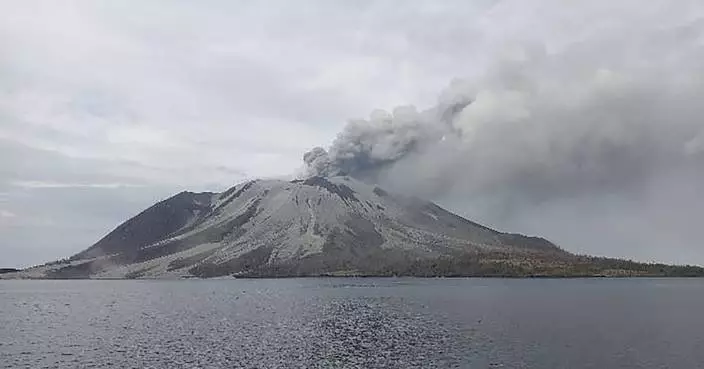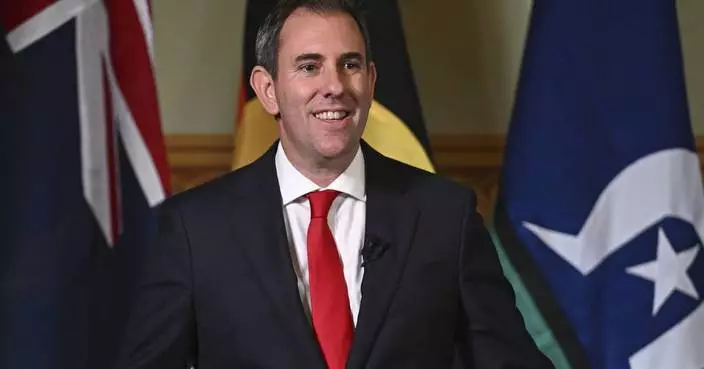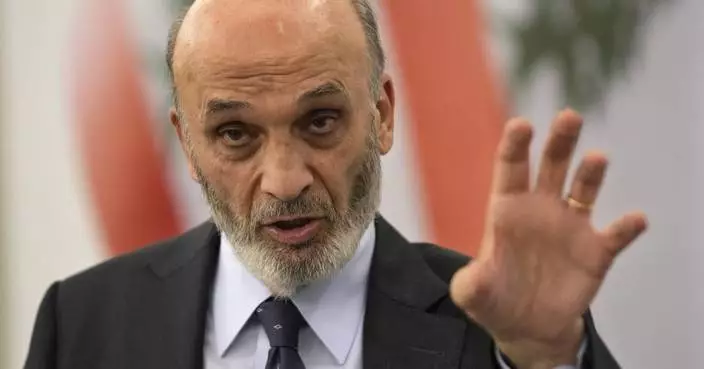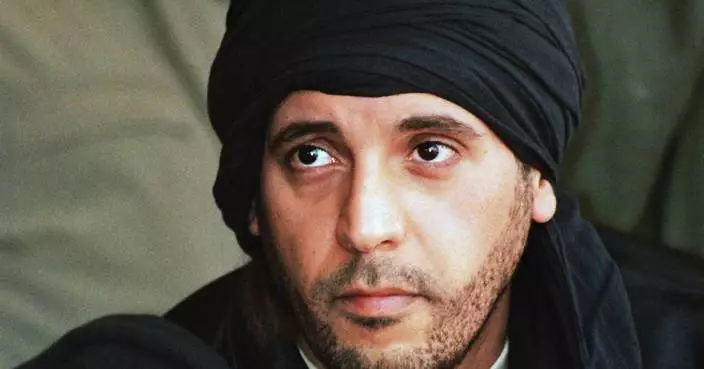Lebanon’s information minister resigned on Sunday as the country grapples with the aftermath of the devastating blast that ripped through the capital and raised public anger to new levels.
The resignation comes as public anger is mounting against the ruling elite, blamed for the chronic mismanagement and corruption that is believed to be behind the explosion in a Beirut Port warehouse. Hundreds of tons of highly explosive material was stored in the waterfront hangar, and a blast sent a shock wave that killed at least 160 people, wounded nearly 6,000 and defaced the coastline of Beirut — destroying hundreds of buildings.
Click to Gallery
Lebanon’s information minister resigned on Sunday as the country grapples with the aftermath of the devastating blast that ripped through the capital and raised public anger to new levels.
“Given the magnitude of the catastrophe caused by the Beirut earthquake that shook the nation and hurt our hearts and minds, and in respect for the martyrs, and the pains of the wounded, missing and displaced, and in response to the public will for change, I resign from the government," she wrote.
Protesters also fanned out around the city, storming a couple of government ministries. They briefly took over the foreign ministry, saying it will be the headquarters of their movement. In the economy and energy ministries, the protesters ransacked offices and seized public documents claiming they would reveal how corruption has permeated successive governments.
Diab took over in January and has since been beset by crises.
In a televised speech Saturday evening, Diab said the only solution was to hold early elections. He called on all political parties to put aside their disagreements and said he was prepared to stay in the post for two months to allow time for politicians to work on structural reforms.
Demonstrators clash with police during a protest against the political elites and the government after this week's deadly explosion at Beirut port which devastated large parts of the capital in Beirut, Lebanon, Saturday, Aug. 8, 2020. (AP PhotoFelipe Dana)
Protestors clash with police during a protest against the political elites and the government after this week's deadly explosion at Beirut port which devastated large parts of the capital in Beirut, Lebanon, Saturday, Aug. 8, 2020. (AP PhotoThibault Camus)
Manal Abdel-Samad said in her resignation letter that change remained “elusive” and she regrets failing to fulfill the aspirations of the Lebanese people.
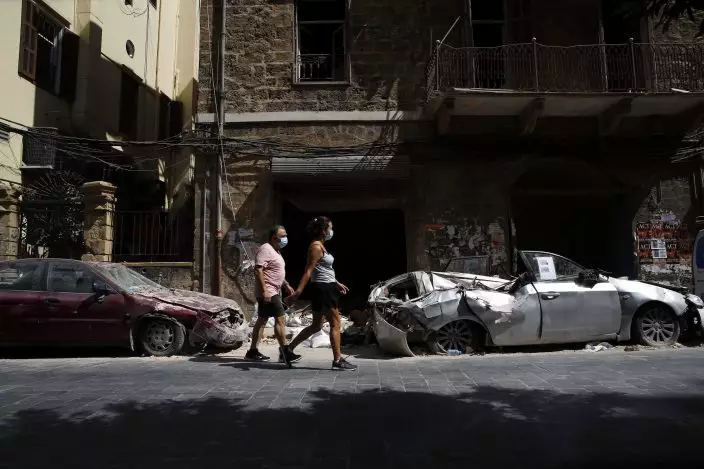
People walk past destroyed cars at a neighborhood near the scene of Tuesday's explosion that hit the seaport of Beirut, Lebanon, Sunday, Aug. 9, 2020. Public fury over the massive explosion in Beirut took a new turn Saturday night as protesters stormed government institutions and clashed for hours with security forces, who responded with heavy volleys of tear gas and rubber bullets. (AP PhotoThibault Camus)
“Given the magnitude of the catastrophe caused by the Beirut earthquake that shook the nation and hurt our hearts and minds, and in respect for the martyrs, and the pains of the wounded, missing and displaced, and in response to the public will for change, I resign from the government," she wrote.
The disaster fueled angry demonstrations Saturday where protesters set up gallows and nooses in central Beirut and held mock hanging sessions of cut-out cardboard images of top Lebanese officials.
Demonstrators held signs that read “resign or hang.” The protests quickly turned violent when the demonstrators pelted stones at the security forces, who responded with heavy volleys of tear gas and rubber bullets. One police officer was killed and dozens of people were hurt in confrontations that lasted for hours.
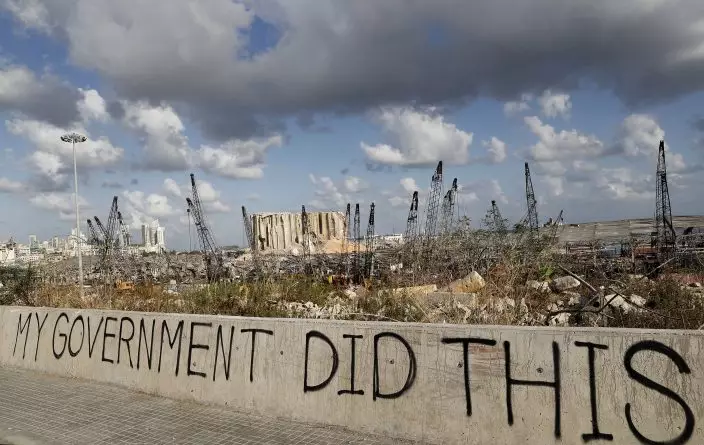
Words are written by Lebanese citizens in front of the scene of Tuesday's explosion that hit the seaport of Beirut, Lebanon, Sunday, Aug. 9, 2020. Public fury over the massive explosion in Beirut took a new turn Saturday night as protesters stormed government institutions and clashed for hours with security forces, who responded with heavy volleys of tear gas and rubber bullets. (AP PhotoHussein Malla)
Protesters also fanned out around the city, storming a couple of government ministries. They briefly took over the foreign ministry, saying it will be the headquarters of their movement. In the economy and energy ministries, the protesters ransacked offices and seized public documents claiming they would reveal how corruption has permeated successive governments.
Five of the parliament's 128 members have also announced their resignation since Saturday— including three legislators of the Christian Kataeb party, a member of the Socialist Progressive Party and an independent.
Abdel-Samad's resignation comes amid reports that another government official — the environment minister — is expected to resign, adding to the challenges facing Prime Minister Hassan Diab.
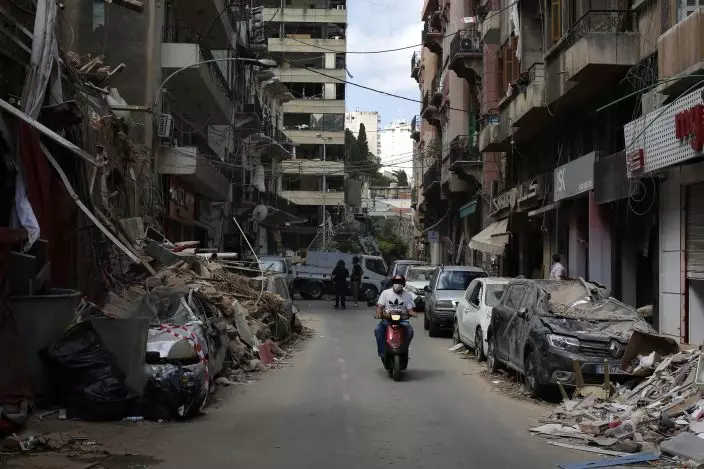
A man rides past damaged buildings at a neighborhood near the scene of Tuesday's explosion that hit the seaport of Beirut, Lebanon, Sunday, Aug. 9, 2020. Public fury over the massive explosion in Beirut took a new turn Saturday night as protesters stormed government institutions and clashed for hours with security forces, who responded with heavy volleys of tear gas and rubber bullets. (AP PhotoThibault Camus)
Diab took over in January and has since been beset by crises.
The government, backed by the powerful militant Hezbollah group and its allies, announced it is defaulting on Lebanon's sovereign debt and has since been engaged in difficult, internally divisive talks with the International Monetary Fund for assistance. The coronavirus restrictions deepened the impact of the economic and financial crisis and fueled public anger against the new government. Lebanese have criticized Diab's government for being unable to tackle the challenges, saying it represents the deep-seated political class that has had a hold of the country's politics since the end of the civil war in 1990.
Foreign Minister Nassif Hitti resigned even before the blast, citing an absence of "effective will to achieve comprehensive structural reform” and competing leadership.
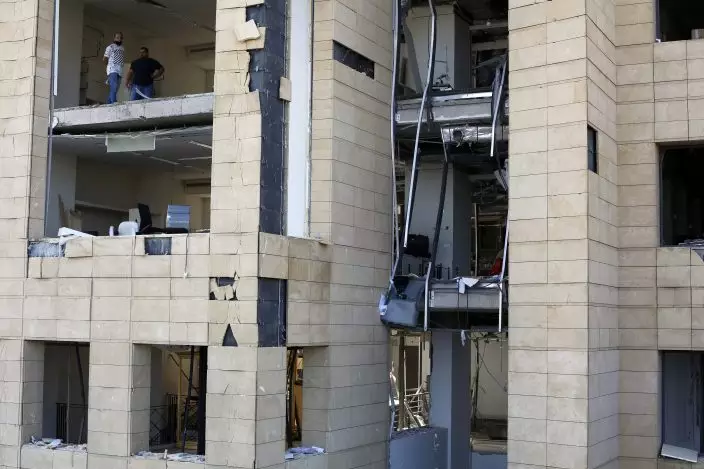
People stand in a damaged building near the scene of Tuesday's explosion that hit the seaport of Beirut, Lebanon, Sunday, Aug. 9, 2020. Public fury over the massive explosion in Beirut took a new turn Saturday night as protesters stormed government institutions and clashed for hours with security forces, who responded with heavy volleys of tear gas and rubber bullets. (AP PhotoThibault Camus)
In a televised speech Saturday evening, Diab said the only solution was to hold early elections. He called on all political parties to put aside their disagreements and said he was prepared to stay in the post for two months to allow time for politicians to work on structural reforms.
The offer is unlikely to soothe the escalating fury on the street. It is also expected to trigger lengthy discussions over the election law amid calls for introducing changes to the country's sectarian-based representation system.
The information minister's resignation comes ahead of an international conference co-hosted by French President Emmanuel Macron and United Nations Secretary-General Antonio Guterres aimed at bringing donors together to supply emergency aid and equipment to Lebanon. Previous offers of aid have been contingent on carrying out significant government reforms to tackle corruption.
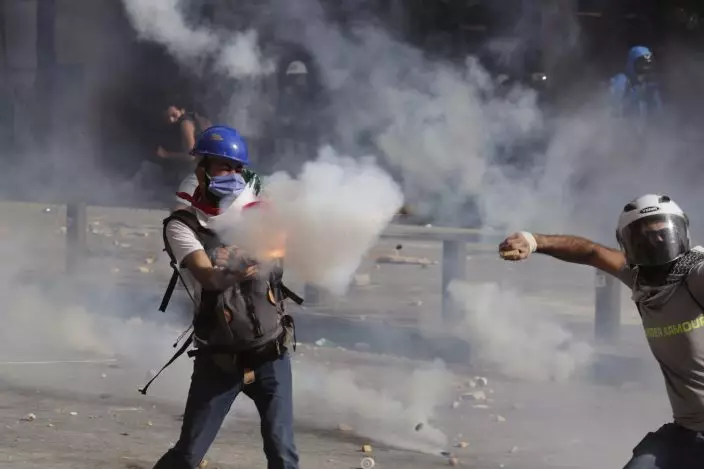
Anti-government protesters clash with riot police officers during a protest against the political elites and the government after this week's deadly explosion at Beirut port which devastated large parts of the capital in Beirut, Lebanon, Saturday, Aug. 8, 2020. (AP PhotoHassan Ammar)
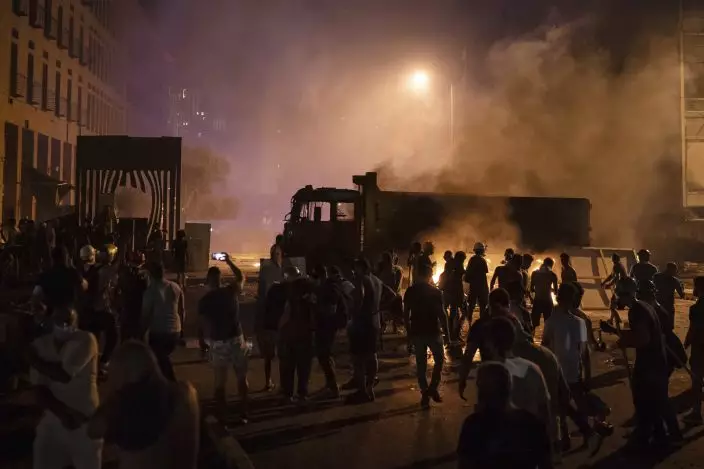
Demonstrators clash with police during a protest against the political elites and the government after this week's deadly explosion at Beirut port which devastated large parts of the capital in Beirut, Lebanon, Saturday, Aug. 8, 2020. (AP PhotoFelipe Dana)
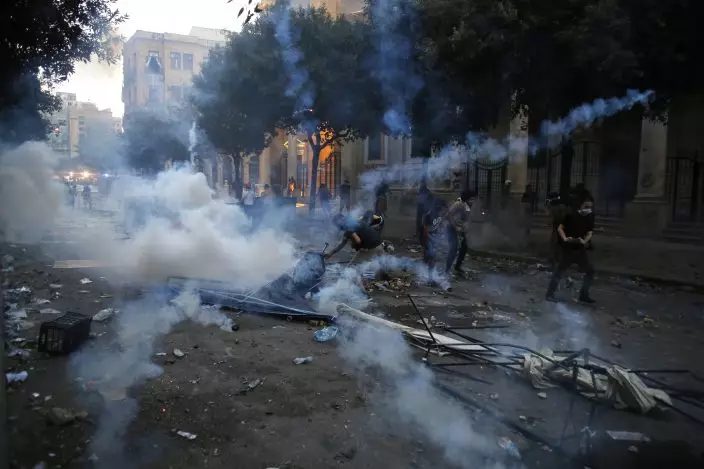
Protestors clash with police during a protest against the political elites and the government after this week's deadly explosion at Beirut port which devastated large parts of the capital in Beirut, Lebanon, Saturday, Aug. 8, 2020. (AP PhotoThibault Camus)
BANGKOK (AP) — Six months into an offensive against Myanmar ’s military government, opposition forces have made massive gains, but civilian casualties are rising sharply as regime troops increasingly turn toward scorched-earth tactics in the Southeast Asian country's bitter civil war.
There is pressure on all fronts from powerful militias drawn from Myanmar's ethnic minority groups and newer resistance forces. Troops are retaliating with air, naval and artillery strikes on hospitals and other facilities where the opposition could be sheltered or aided.
“When the mass of people rise up against them, I think it terrifies them,” said Dave Eubank, a former U.S. Special Forces soldier who founded the Free Burma Rangers, a humanitarian aid organization that has provided assistance to both combatants and civilians in Myanmar since the 1990s.
“They know that hospitals, churches, schools and monasteries are important places for human care, and gathering, and symbols — and they hammer them," said Eubank. "That’s new.”
Military forces now control less than half the country, but are holding on tenaciously to much of central Myanmar including the capital, Naypyidaw — recently targeted by drone attacks — and largest city, Yangon, and is far better armed than the resistance forces, with support from Russia and China.
“People have been saying that the regime was on the brink of collapse since two weeks after the coup,” in February 2021, said Morgan Michaels, an analyst with the International Institute of Strategic Studies who runs its Myanmar Conflict Map project.
“On the other hand, obviously the regime is weaker than it’s ever been.... so there’s no doubt that it’s in serious, serious trouble," he said.
Thet Swe, a spokesman for the military government, denied that troops were targeting buildings and areas where civilians were sheltering, blaming their destruction instead on the opposition forces, without citing evidence.
“The military never harmed hospitals, churches and civilians in our country,” he told The Associated Press in an email. “They did not use that strategy and are fighting the rebels only for the sovereignty of our country.”
As the fighting has moved into more populated areas, about 1 million people have been forced to flee their homes since the start of the offensive in October, contributing to the more than 3 million internally displaced people in the country of some 56 million, according to the U.N.'s humanitarian aid agency.
With the collapse of its health care system and food supplies dwindling, 18.6 million people are in need, up 1 million from a year ago, including 6 million children, the agency said.
Opposition in Myanmar, also known as Burma, had been growing since the army seized power from the elected government of Aung San Suu Kyi in February 2021, but it gained new momentum in October when major militias known collectively as the Three Brotherhood Alliance launched a joint offensive.
Together, the Arakan Army, the Myanmar National Democratic Alliance Army and the Ta’ang National Liberation Army — among the most powerful militias formed by Myanmar’s ethnic minorities — made quick advances.
As they captured huge swaths of territory largely in the north and northeast, including economically important border crossings with China and several major military bases, other ethnic armed groups sensed momentum and joined the fighting.
At the same time, People’s Defense Forces — armed resistance groups that support the shadow National Unity Government, which views itself as Myanmar’s legitimate administration — have been increasing in number and launching their own attacks, often supported and trained by the ethnic armed militias.
Both sides claim they have inflicted heavy tolls. And the military government under Senior Gen. Min Aung Hlaing has acknowledged it is under pressure, recently reintroducing conscription to increase its ranks.
That has pushed some young people into the resistance. Many more have fled to rural areas or neighboring countries to avoid fighting.
With the violence across its border, China helped broker a cease-fire in Myanmar's north in January with the Three Brotherhood Alliance. But the alliance's Arakan Army continues to fight in its home Rakhine state in the west and has made significant gains, while PDFs and other ethnic armed groups continue their own attacks elsewhere.
The fiercest fighting in recent weeks has been in the southeast, where the main ethnic Karen fighting force, the Karen National Liberation Army, claimed in early April to have seized all the military bases in Myawaddy, the main town on the border with Thailand in Kayin state, also known as Karen state.
One army battalion clung to a position beside one of Myawaddy's two bridges, assisted by the Border Guard Force, a rival Karen group that had been in charge of border area security for years, conducting lucrative business by providing protection to area casino resorts with links to organized crime.
The force, which declared itself neutral in January, now controls the town with military government administrators still in place, highlighting how some militia groups still prioritize their own interests.
“This is not a black and white situation. This is not the regime reconquering and reconsolidating control," Michaels said of the fighting in the area. “This is the regime hanging on, keeping a foothold by the razor's edge.”
Meanwhile, the military has pushed KNLA and People’s Defense Forces out of Kawkareik, a strategically important town along the road that connects Myawaddy with the rest of the country.
Thousands of civilians have fled Myawaddy and Kawkareik. But many civilians haven't managed to escape.
At least 1,015 civilian deaths have been documented from Nov. 1 through May 1, according to the Assistance Association for Political Prisoners, a watchdog group that tracks political arrests, attacks and casualties. It says 4,962 civilians have been killed overall since the military took power three years ago.
The watchdog blamed the deaths on the military's increasing use of scorched-earth tactics and fighting moving into more populated areas.
“The military has increasingly lost areas of control in recent months, which has only increased their use of this strategy, responding with airstrikes, shelling and so on in civilian areas,” the AAPP said in an email.
The group added that the number of civilian deaths in the recent months of fighting is likely double what it reported, if not more, but that it can’t document the numbers due to the intensification of the conflict.
Kyaw Zaw, a spokesperson for the shadow National Unity Government, said the military had destroyed 343 hospitals and clinics since it took power, and that those attacks had accelerated in the last two months, though he didn't have specific details.
Eubank, with the Free Burma Rangers, said he and his teams operating near the front lines have witnessed the military, known as the Tatmadaw, fighting with a “ speed and force and a viciousness that we’ve never seen.”
But in fighting a common enemy, the resistance is showing growing unity, he said.
“The Burma army is still stronger than any of these resistance groups, and if they want to bring a division or two to bear, they will win the battle, but they’re not stronger than everybody else together," he said.
Whether that unity will continue if the regime falls, and if the disparate resistance forces can agree on a common path ahead for Myanmar, is an open question, Michaels said.
“On one hand, Myanmar is not Syria — there is common cause in fighting the regime,” Michaels said. “But at the same time, as the regime has receded from some areas, there are at least indicators of potential future conflicts between groups.”
He noted an incident in northern Shan state last month in which troops from two members of the Three Brotherhood Alliance — the Myanmar National Democratic Alliance Army and the Ta’ang National Liberation Army — traded fire over a territorial dispute. One person was injured.
The groups quickly agreed to stand down, but the incident illustrates that territorial tension is real, Michaels said.
An opposition politician still inside the country, speaking on condition of anonymity for his own safety, said Myanmar's people have a common desire for peace and stability, but the various factions still pursue their own interests.
“It is hard to predict what is ahead, and they still don't have a single political direction or goal. I think there is quite a problem in this situation," he said.
“Myanmar is now at a crossroads."
Follow AP’s Asia-Pacific coverage at https://apnews.com/hub/asia-pacific
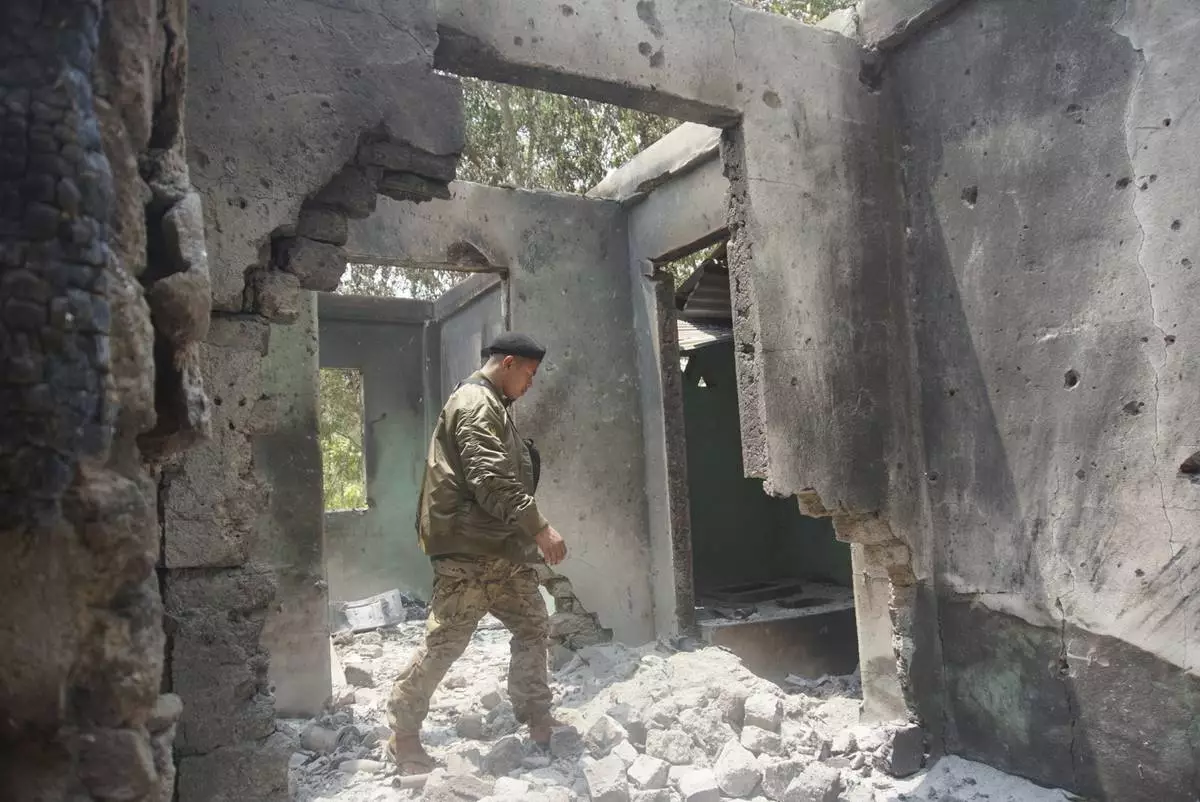
FILE - Saw Win Myint, a commander of a military unit under the Karen National Union, the leading political body for the Karen ethnic minority that is part of the resistance against military rule in Myanmar, inspects the damaged armory in the captured army base of Infantry Battalion 275 in Myawaddy township in Kayin state, Myanmar, on April 12, 2024. Six months into an offensive against Myanmar’s military administration, opposition forces have made massive gains, but civilian casualties are rising sharply as regime troops increasingly turn toward scorched-earth tactics in the Southeast Asian country's bitter civil war. (AP Photo/Metro, File)
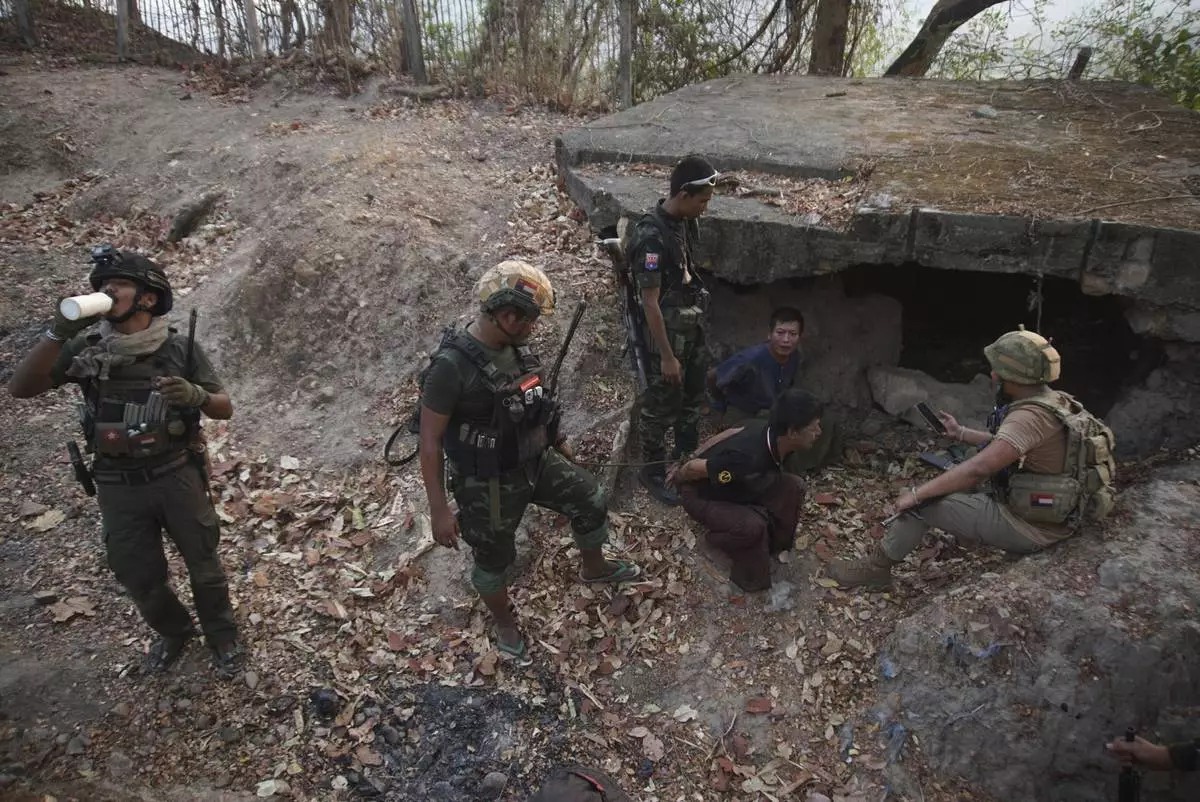
FILE - Members of the Karen National Liberation Army and People's Defense Force examine two arrested soldiers after they captured an army outpost, in the southern part of Myawaddy township in Kayin state, Myanmar, March 11, 2024. Six months into an offensive against Myanmar’s military administration, opposition forces have made massive gains, but civilian casualties are rising sharply as regime troops increasingly turn toward scorched-earth tactics in the Southeast Asian country's bitter civil war. (AP Photo/METRO, File)
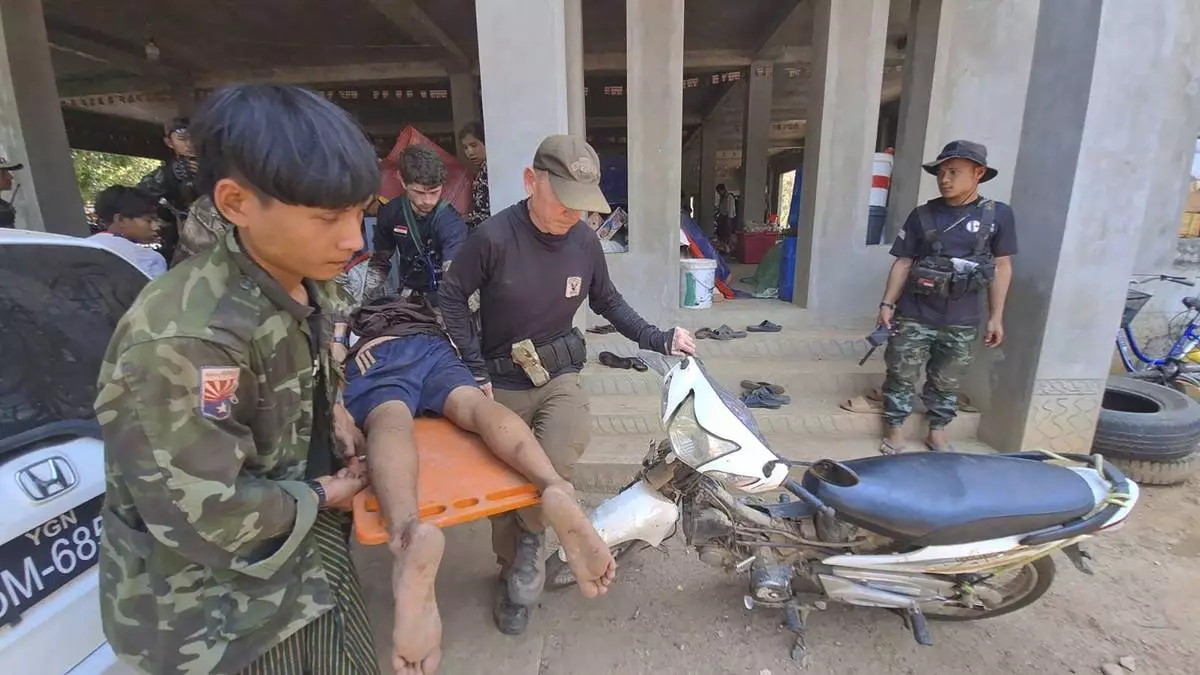
In this undated photo released by the Free Burma Rangers, Dave Eubank, center, founder of the Free Burma Rangers, evacuates the wounded after a Buddhist monastery sheltering civilians displaced by fighting in the town of Papun, Karen state, Myanmar was attacked on March 31, 2024 by a regime warplane. (Free Burma Rangers via AP)
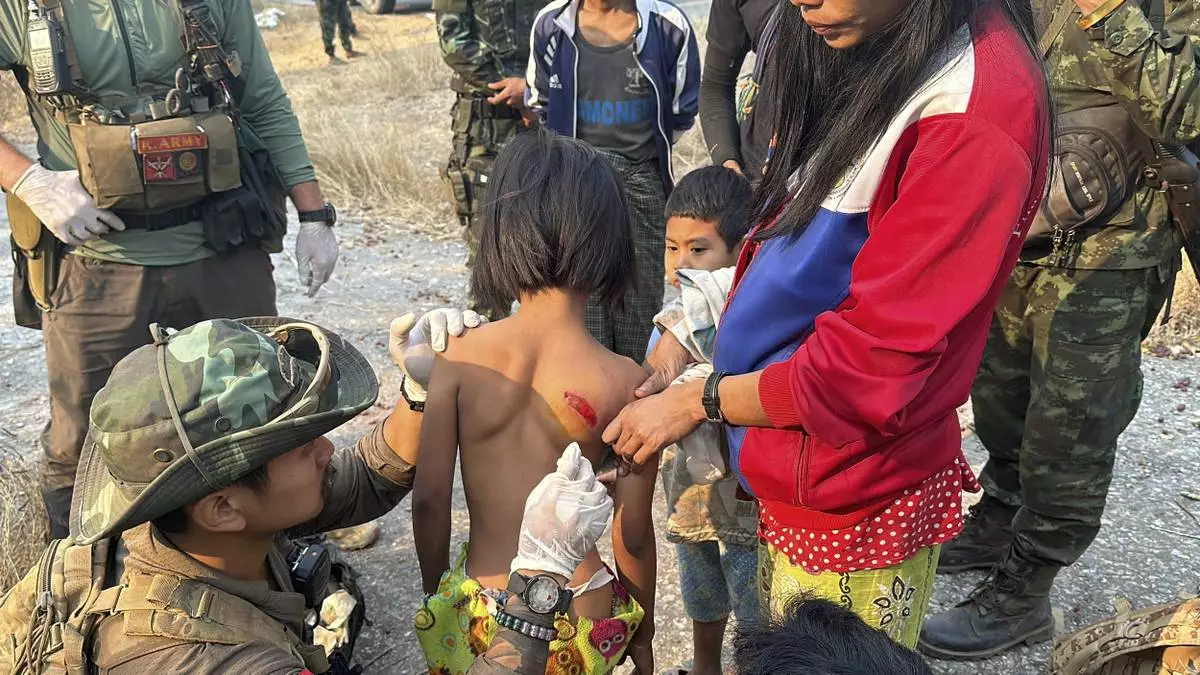
In this photo released by the Free Burma Rangers, a child is seen wounded by Burma military in Pasaung, Karenni state, Myanmar on March 1, 2024. (Free Burma Rangers via AP)
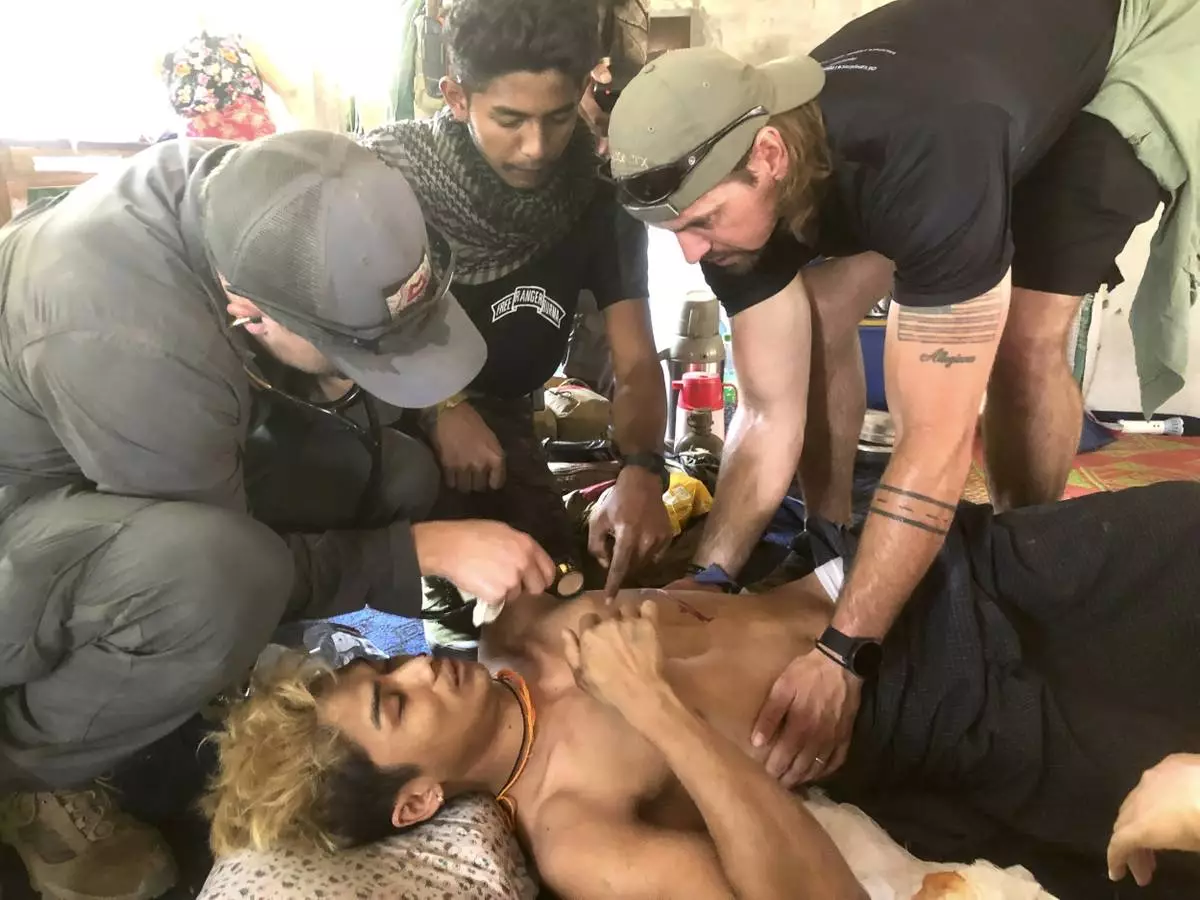
In this undated photo released by the Free Burma Rangers, a wounded person is treated after a Buddhist monastery sheltering civilians displaced by fighting in the town of Papun, Karen state, Myanmar was attacked on March 31, 2024 by a regime warplane. (Free Burma Rangers via AP)
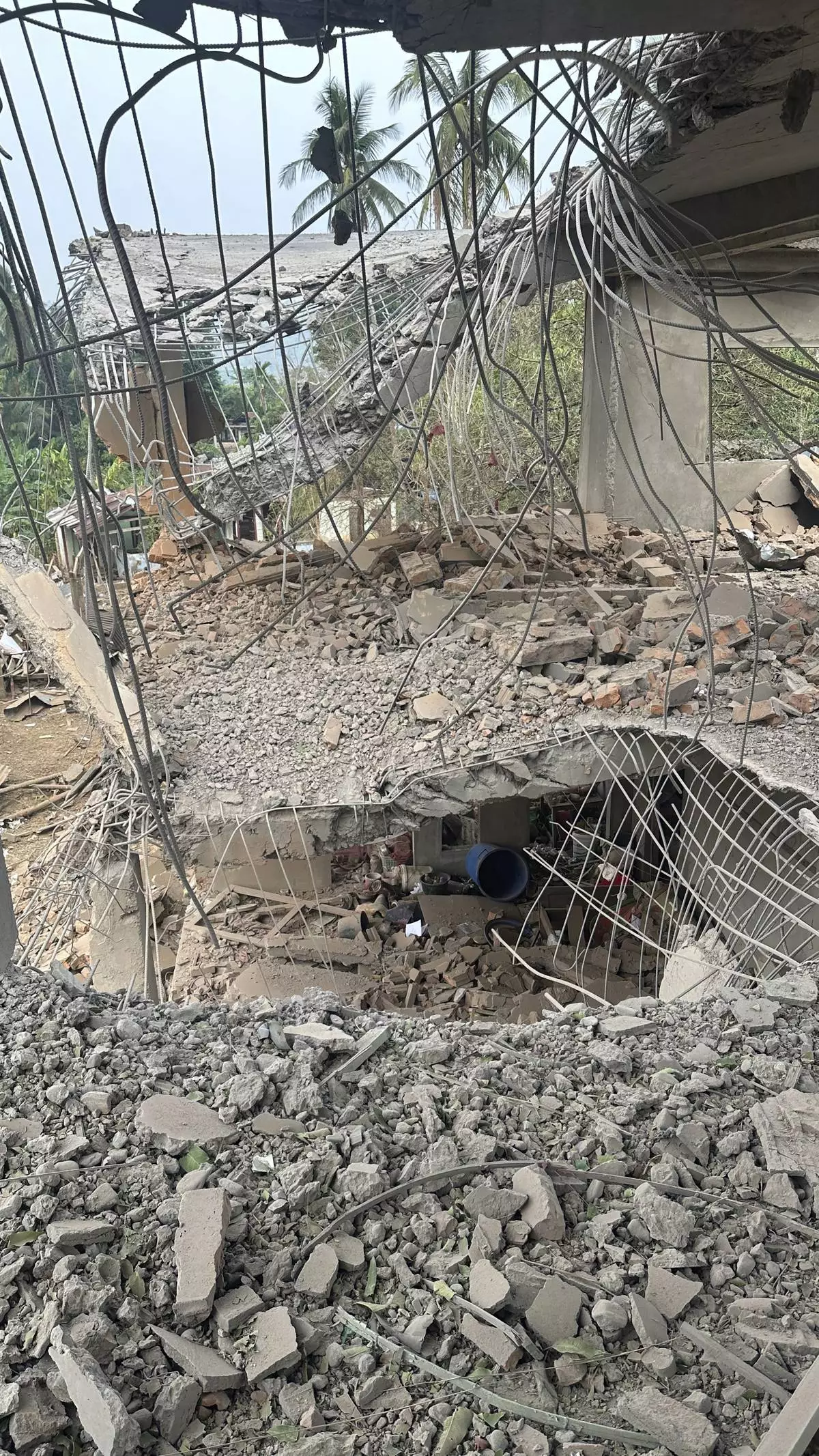
This undated photo released by the Free Burma Rangers, shows a destruction after a Buddhist monastery sheltering civilians displaced by fighting in the town of Papun, Karen state, Myanmar was attacked on March 31, 2024 by a regime warplane. (Free Burma Rangers via AP)
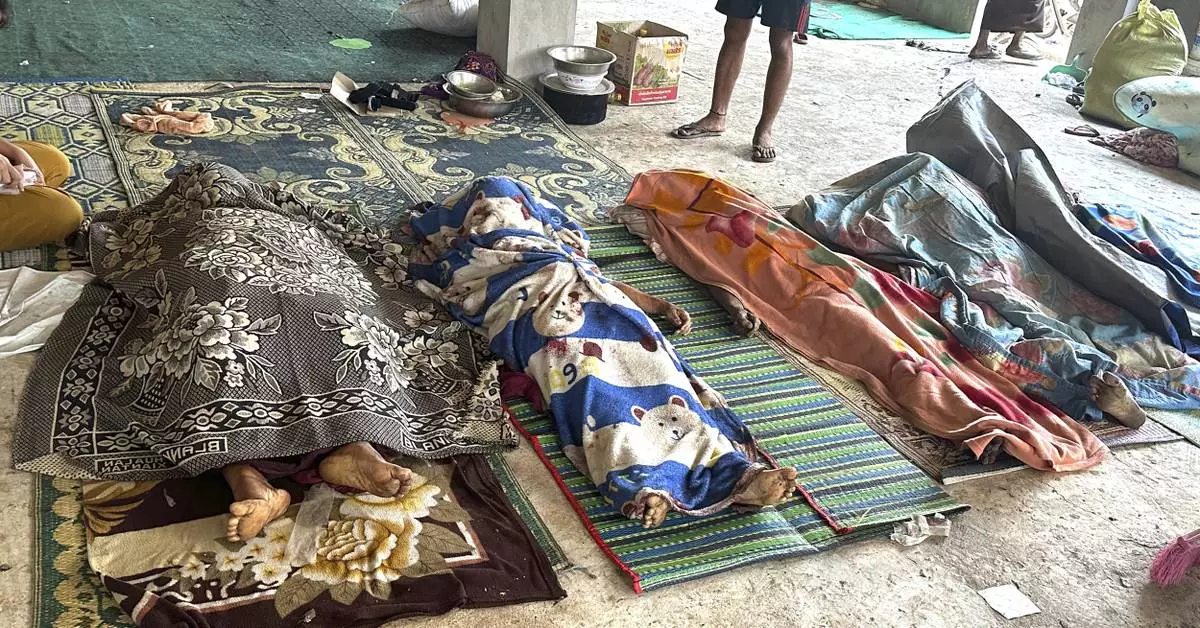
This undated photo released by the Free Burma Rangers, shows the bodies of the five victims out of eight after a Buddhist monastery sheltering civilians displaced by fighting in the town of Papun, Karen state, Myanmar was attacked on March 31, 2024 by a regime warplane. (Free Burma Rangers via AP)
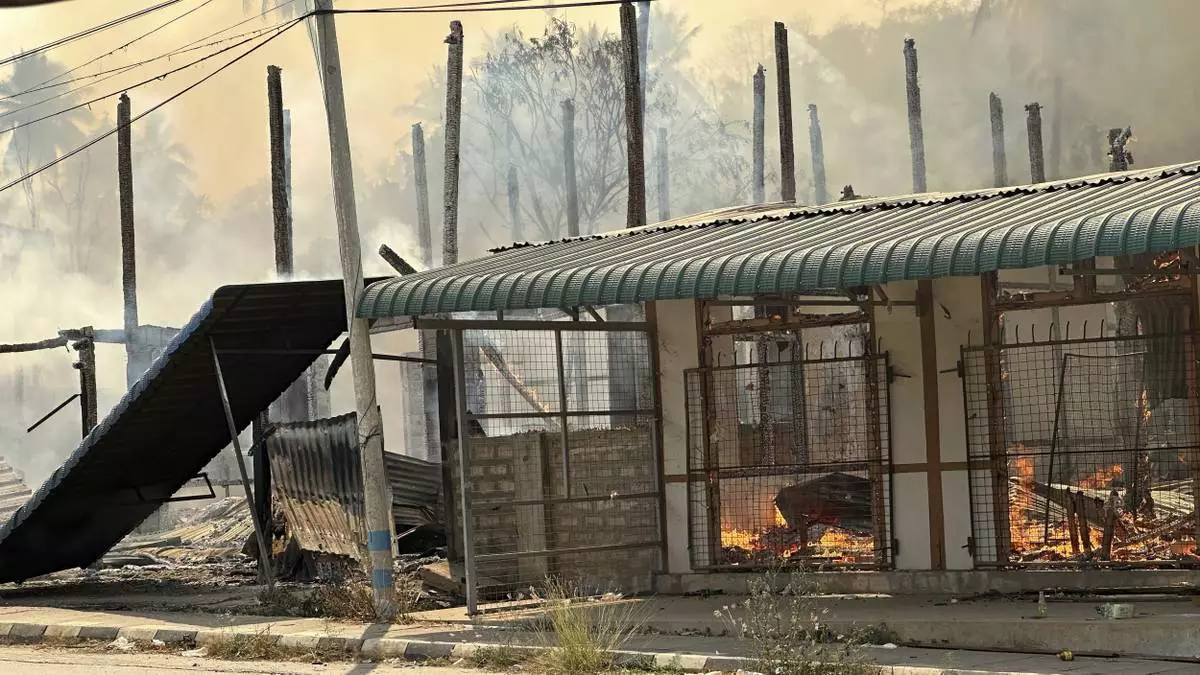
In this photo released by the Free Burma Rangers, a building burns in Pasaung, Karenni state, Myanmar in March, 2024, after a Burmese military airstrike and mortars destroyed the town. (Free Burma Rangers via AP)
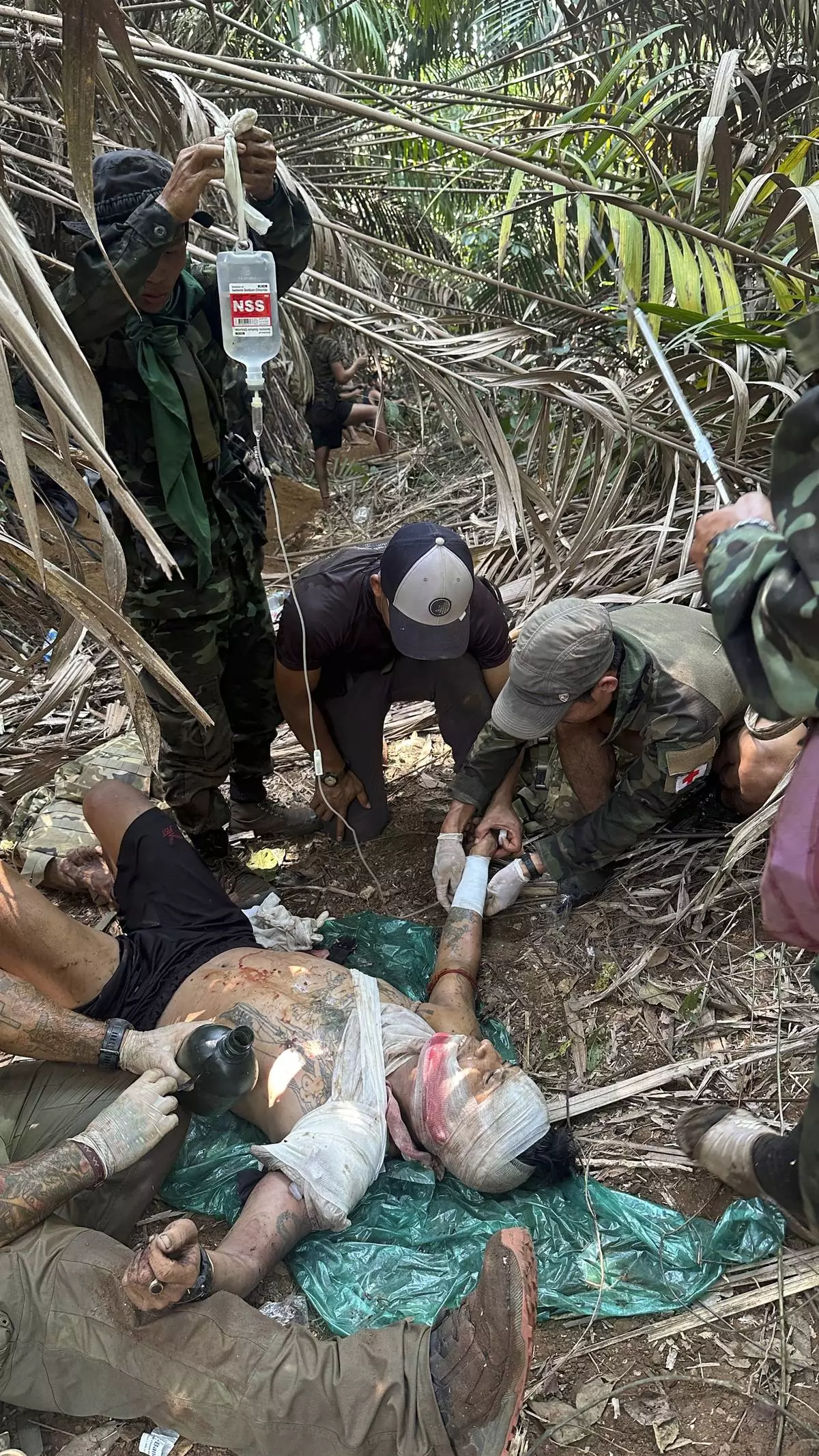
In this photo released by the Free Burma Rangers, a wounded person is treated in Karen state, Myanmar on April 24, 2024. (Free Burma Rangers via AP)
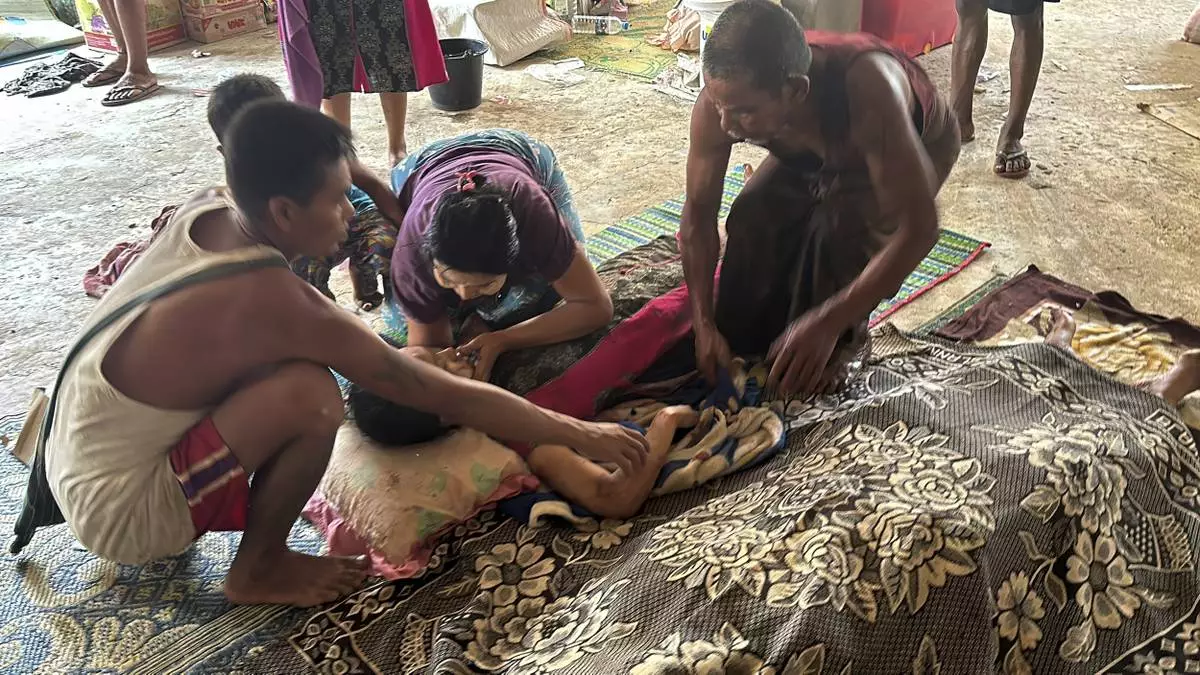
In this undated photo released by the Free Burma Rangers, a mother prays for her 17-year-old daughter to live after a Buddhist monastery sheltering civilians displaced by fighting in the town of Papun, Karen state, Myanmar was attacked on March 31, 2024 by a regime warplane. (Free Burma Rangers via AP)
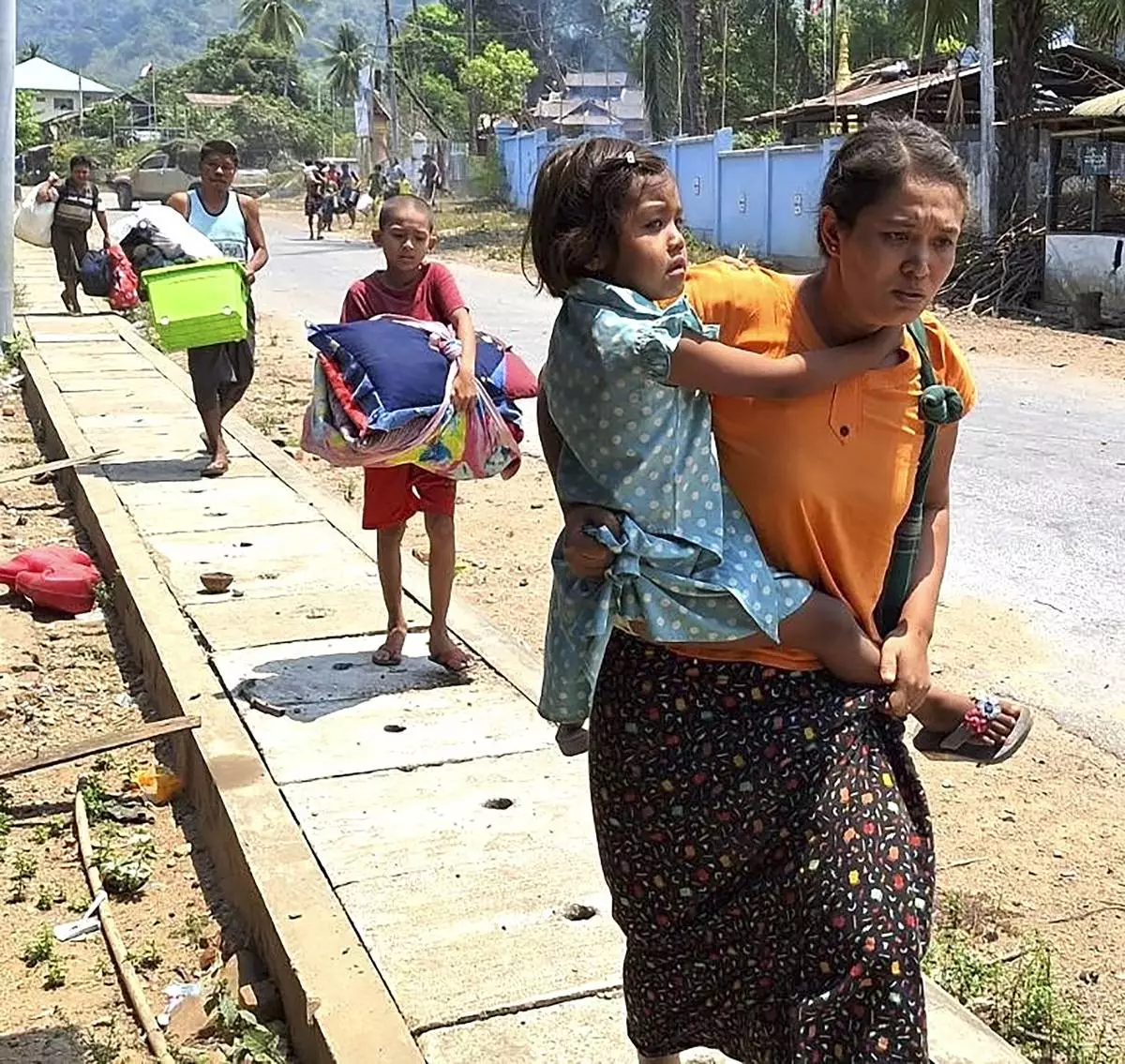
In this photo released by the Free Burma Rangers, families flee after a Buddhist monastery sheltering civilians displaced by fighting in the town of Papun, Karen state, Myanmar was attacked on March 31, 2024 by a regime warplane. (Free Burma Rangers via AP)
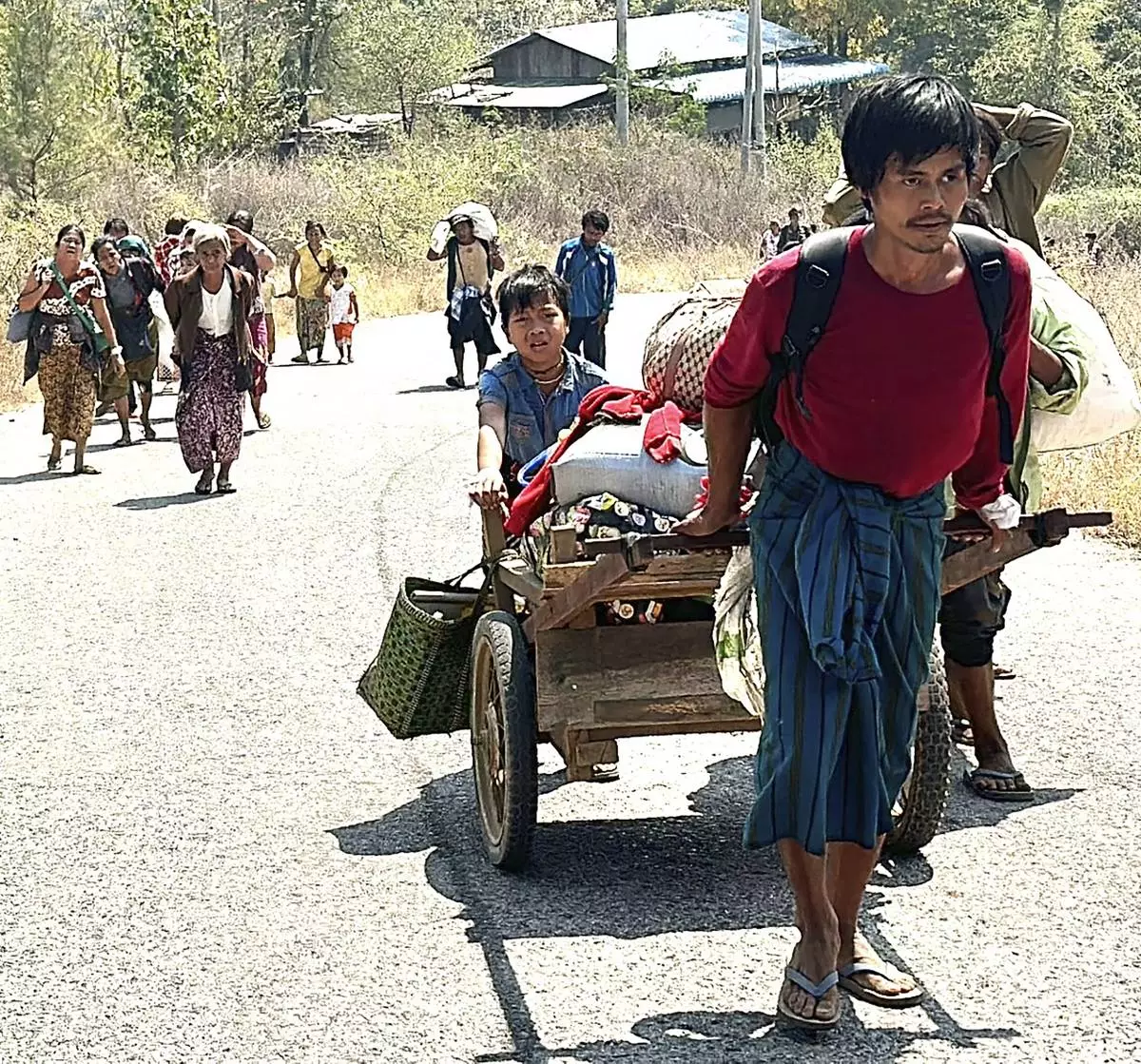
In this photo released by the Free Burma Rangers, people flee Myanmar military in Pasaung, Karenni state, Myanmar on March 1, 2024. (Free Burma Rangers via AP)
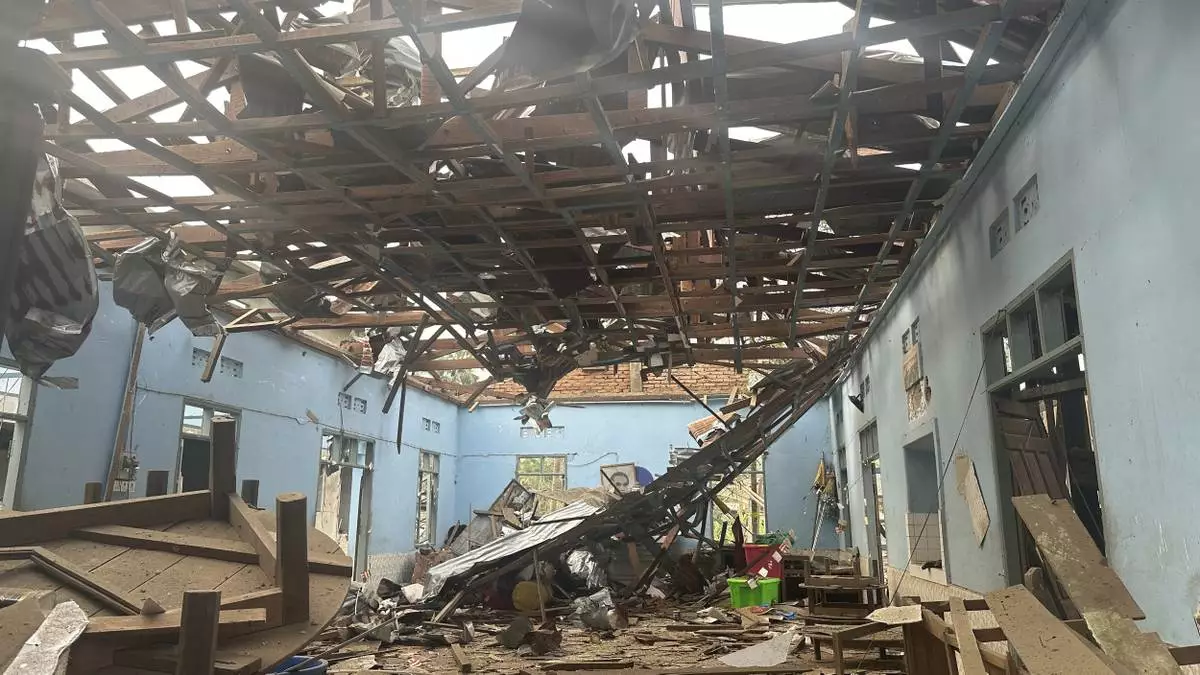
This undated photo released by the Free Burma Rangers, shows a monastery in Papun, Karen state, Myanmar after the monastery sheltering civilians displaced by fighting in the town was attacked on March 31, 2024 by a regime warplane. (Free Burma Rangers via AP)
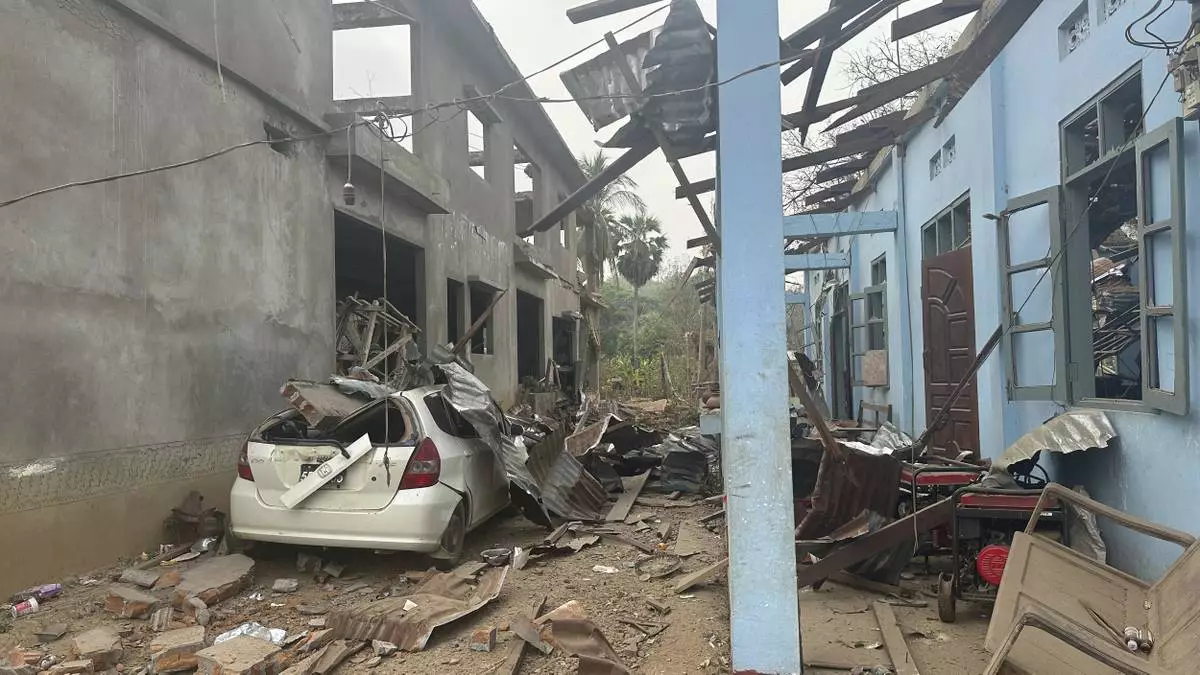
This undated photo released by the Free Burma Rangers, shows a monastery destroyed by a Burmese military airstrike on March 31, 2024, in Papun, Karen state, Myanmar. (Free Burma Rangers via AP)
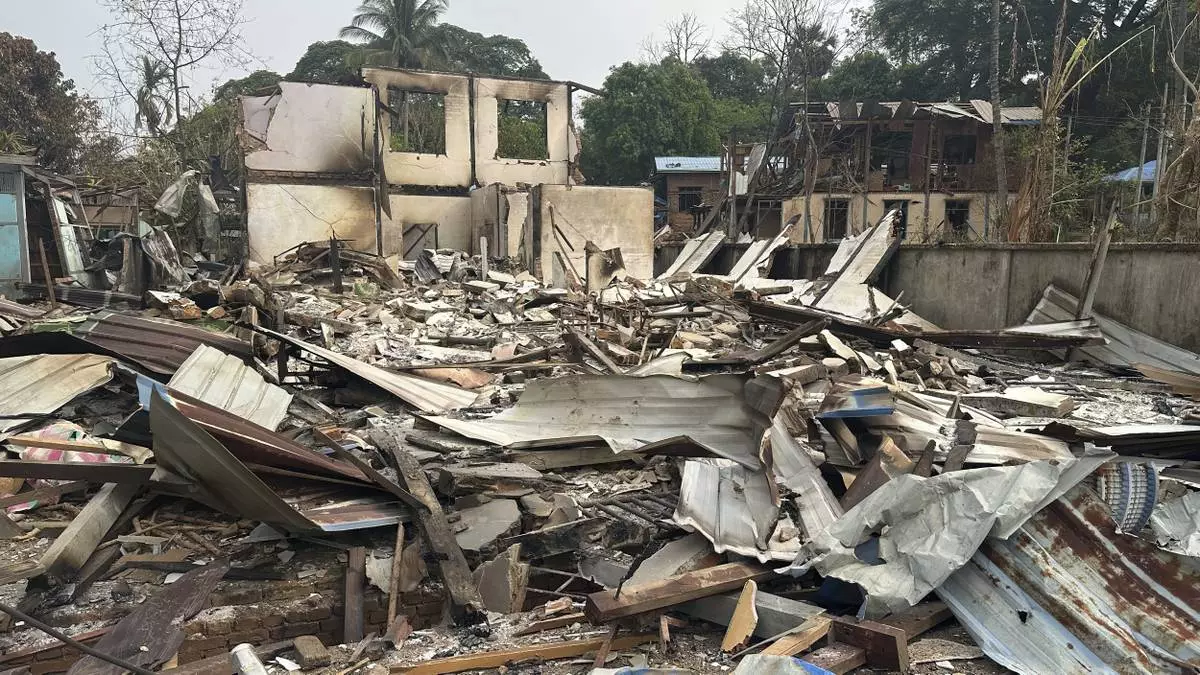
This undated photo released by the Free Burma Rangers, shows a monastery destroyed by a Burmese military airstrike on March 31, 2024, in Papun, Karen state, Myanmar. (Free Burma Rangers via AP)



























